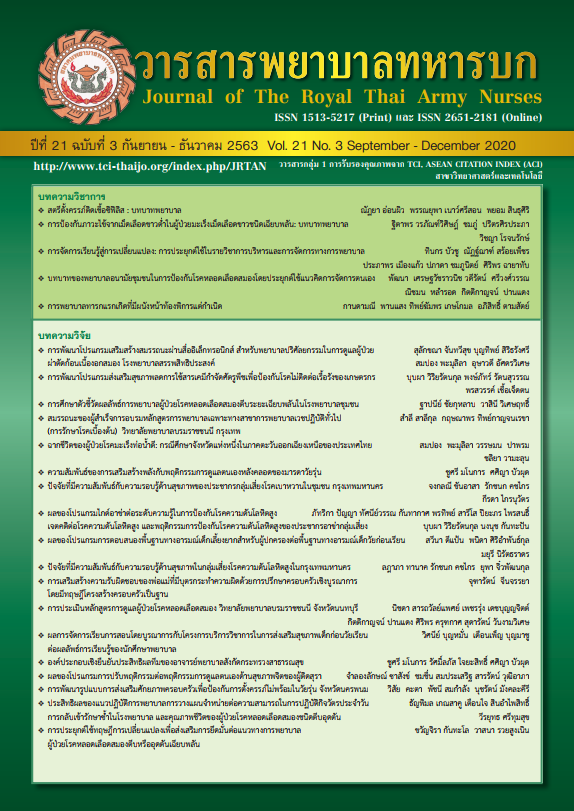The Development of Registered Nurses’ Core Competencies in Neurology Nursing Care, Prasat Neurological Institute
Keywords:
Registered nurse, Competency, Neurology nursing careAbstract
This research aimed to develop of registered nurses’ core competencies in neurology nursing care, Prasat neurological institute. This competency develops by 17 experts’ registered nurses. Purposive sampling was used for 104 registered nurses who worked in related neurological wards with at least one-year experiences. The research instrument consisted of 1) Semi-open-ended questionnaire for experts; 2) personal data and 3) registered nurses’ core competencies assessment in neurology nursing care. They were tested for content validity by 5 experts. The content validity index was 0.99 and the reliability coefficients was 0.979. Data analyzed by using frequency, percentage, average score, standard deviation, and factor analysis with correlation matrix, factor extraction with principal component analysis, and factor rotation by orthogonal rotation and varimax.
The results of this research showed the nurses’ core competencies in neurology nursing care of Prasat neurological institute has a total of 10 components and 77 variables were 1) nursing care for ischemic stroke patient; 2) nursing care to prevent neurological complications; 3) Knowledge and ability of nursing process utilization; 4) nursing care for neuroimmunology patient; 5) nursing care for epilepsy patient; 6) discharge planning for rehabilitation and continuum care; 7) cardiopulmonary resuscitation nursing implementation; 8) educating, advising, and mentoring for novice personnel; 9) nursing care for heart and circulatory systems; and 10) basic swallowing assessment. Nursing administrators can use the research results as a guideline for selecting registered nurses who have knowledge, specific expertise for working in neurological nursing care to make patients receive appropriate care, safety, and achieve good nursing outcomes.
Downloads
References
Health Department, Bangkok Metropolitan. Nursing personnel competency development manual; competency development. Bangkok: Health Department; 2011. (in Thai)
Saenprasan P, Kalyangkura R, Pongkiatchai R, et al. Nursing Management for Safety. Bangkok: Sukhumvit Printing; 2006. (in Thai)
Marrelli AF, Tondora J, & Hoge MA. Strategies for developing competency model. Administration and Policy in Mental Health 2005; 32(5): 533-561.
Office of the civil service commission. The manual defines the knowledge, ability, skills, and functional competency. Nonthaburi: Prachumchang Co., Ltd.; 2010. (in Thai)
Thailand Nursing and Midwifery Council. Competency of nurse. Bangkok: Thailand Nursing and Midwifery Council; 2009. (in Thai)
Orcan F. Exploratory and confirmatory factor analysis: Which one to use first?. Journal of measurement and evaluation in education and psychology 2018; 9(4): 414-421.
Srisatidnarakul B. The methodology in nursing research. Bangkok: You and I Intermedia Ltd; 2010. (in Thai)
Singchongchai P. Principles and using multivariate statistics analysis for nursing research. Songkhla: Chanmuang Printing; 2006. (in Thai)
Phanthumchinda K, and Likitjaroen Y. Basic guidelines for evaluating stroke patients. in Nijasri Charnnarong (Suwanwela) (editor), Management of Acute Ischemic Stroke. Bangkok: the printing house of Chulalongkorn university; 2009. (in Thai)
London Cardiac and Stroke Networks. London hyper acute stroke unit nursing competencies workbook: London; 2011.
Srikanok W. The development of competency framework of the royal Thai army nursing college’s personnel. Journal of The Royal Thai Army Nurses 2013; 14(3): 151-158. (in Thai)
Prasat Neurological Institute, Department of medical services, Ministry of public health. Clinical practice guidelines: multiple sclerosis and neuromyelitis optica spectrum disorder for physician. Bangkok: Tana press Co.,Ltd; 2018. (in Thai)
Prasat Neurological Institute, Department of medical services, Ministry of public health. Clinical nursing practice guideline for epilepsy. Bangkok: Tana press Co.,Ltd; 2014. (in Thai)
Jakping J. Effects of using a discharge planning program for stroke patients on length of hospital stays and caring ability of stroke patients’ caregiver, Nan hospital. (thesis). Bangkok: Faculty of Nursing, Chulalongkorn University; 2009. (in Thai)
Adam C. Stroke competency toolkit (SCoT): Evaluation of SCoT pilot project. Edinburgh: Chest, Heart and Stroke Scotland; 2010.
Saenprasan P. Concepts and principles of nursing performance capability. In Penchun Saenprasan, Duangkamol Wattradul and Bubpawon Srilum (editors), nursing for safety: CVT nurse competencies. Bangkok: Sukhumvit Printing; 2011. (in Thai)
Chaparangsee J. Neurosurgical nurses’ competency. Journal of nursing division 2017; 44: 41-61. (in Thai) 18. Chobchuen R. Nursing role in rehabilitation of patients with dysphagia. Srinagarind medical journal 2014; 29: 13-15. (in Thai)
Downloads
Published
How to Cite
Issue
Section
License
บทความหรือข้อคิดเห็นใดใดที่ปรากฏในวารสารพยาบาลทหารบกเป็นวรรณกรรมของผู้เขียน ซึ่งบรรณาธิการหรือสมาคมพยาบาลทหารบก ไม่จำเป็นต้องเห็นด้วย
บทความที่ได้รับการตีพิมพ์เป็นลิขสิทธิ์ของวารสารพยาบาลทหารบก
The ideas and opinions expressed in the Journal of The Royal Thai Army Nurses are those of the authors and not necessarily those
of the editor or Royal Thai Army Nurses Association.






